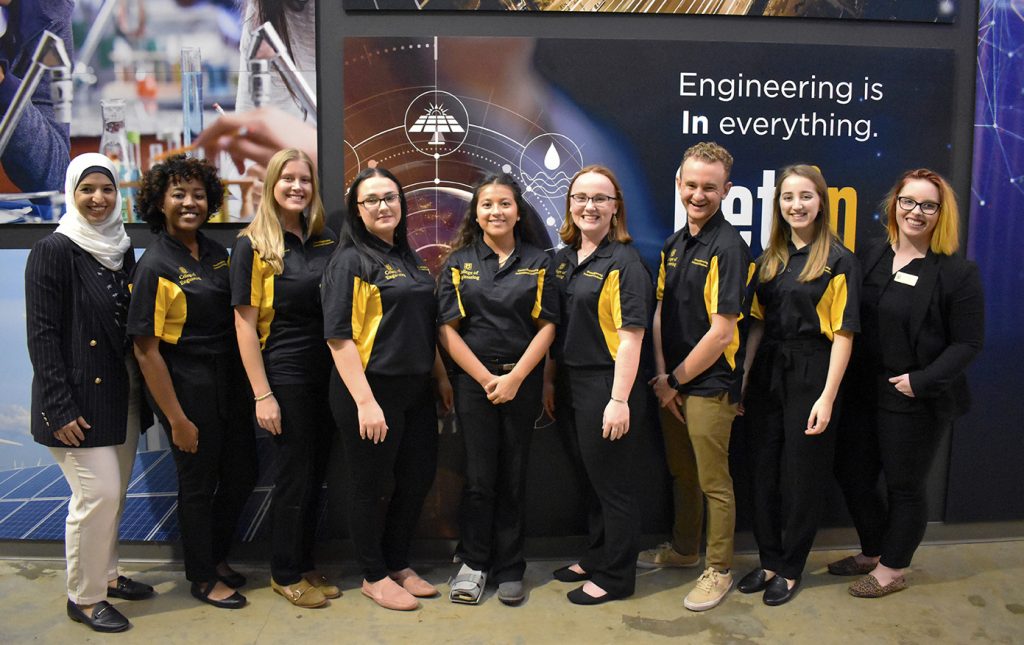May 26, 2020

Tojan Rahhal (left), Assistant Dean for Inclusive Excellence and Strategic Initiatives, poses with members of the Engineering Diversity Collaborative Evonne Weeden, Brooke Flynn, Kate Clemens, Victoria Sanchez, Jacqueline Miller, Andrew Guardia and Samantha Sample, along with Hilary Mueller, Director of the Office Diversity and Outreach Initiatives, during a break at the Diverse Engineering Professionals Conference last fall.
The College of Engineering established the Diverse Engineering Professionals Conference (DEPC) in 2017 to recognize diversity organizations and diverse students while promoting the college’s core college values of integrity, excellence and collaboration. Several student organizations, under the leadership of Assistant Dean for Inclusive Excellence and Strategic Initiatives Tojan Rahhal, launched the first conference in 2017 in collaboration with the Engineering Leadership, Engagement and Career Development Academy and the Office of Diversity and Outreach initiatives. That first year, nine industry sponsors participated and about 75 people attended. In the second year, the conference nearly doubled its impact with 12 companies and 150 attendees, including students from all majors, years and demographics. The conference continued to grow in its third year. That success was the topic of a presentation given by former Dean Elizabeth Loboa when she was inducted as a Fellow by the National Academy of Inventors (NAI) in 2019.
Following her presentation at NAI, Loboa, Rahhal and Associate Dean of Economic Development and Industrial Engagement Steve Devlin submitted a paper to the NAI, which recently was published in the latest issue of the NAI’s Technology and Innovation Issue: Connecting the Innovation Community. The paper, “Inclusive Innovation: Creating a Conference to Promote Diversity in Science, Technology, Engineering and Math” notes the “growing need for inclusive innovation and the removal of barriers for the next generation of students in science, technology, engineering and math (STEM).”
Positive Impact
The authors say a typical college student does not know much about a company’s culture except what they can see during interviews, internships or what they hear from other students. “DEPC allows company representatives to be present at a conference that is focused on valuing diversity,” they write. “They have a chance to share information about their employee resource groups, such as women’s resource groups and multicultural resource groups, which are typically corporate versions of student organizations.”
The authors also note that feedback was collected after each conference and that the findings have been positive. “Company representatives indicated that they enjoyed and had the most interaction with students at the exhibit fair and the networking lunch. Students felt they were more prepared to network with representatives because of the intimate nature of the conference. In addition, students indicated they gained knowledge about how diversity and engineering are linked.”
In conclusion, the authors noted the benefits to students who attended the DEPC. “The conference benefited students from groups traditionally underrepresented in STEM by helping overcome imposter syndrome, stereotype threat and existing biases about being a minority in STEM. It grew to include an avenue for non-minority allies to support their peers.”
The 4th annual Diverse Engineering Professional Conference currently is scheduled for Oct. 10, 2020. Activities will include a company exhibits fair, professional development and company information workshops, networking with peers and company representatives and diversity education workshops. Companies, alumni, faculty, staff and students are invited to attend.